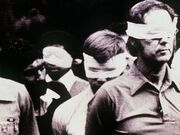No edit summary |
No edit summary |
||
| Line 7: | Line 7: | ||
The releasing of the hostages on the same day as Ronald Reagan’s inaugural address, has come to be known as the {{wp|October Surprise conspiracy theory|October Surprise conspiracy}}. The conspiracy came to light by Gary Sick, principal White House aide for Iran and the Persian Gulf on the Carter administration's National Security Council, in his book ''October Surprise: America's Hostages in Iran and the Election of Ronald Reagan''.<ref>{{wiki|Iran hostage crisis#October Surprise conspiracy theory}}</ref> |
The releasing of the hostages on the same day as Ronald Reagan’s inaugural address, has come to be known as the {{wp|October Surprise conspiracy theory|October Surprise conspiracy}}. The conspiracy came to light by Gary Sick, principal White House aide for Iran and the Persian Gulf on the Carter administration's National Security Council, in his book ''October Surprise: America's Hostages in Iran and the Election of Ronald Reagan''.<ref>{{wiki|Iran hostage crisis#October Surprise conspiracy theory}}</ref> |
||
| + | |||
| + | {{MonthBar}} |
||
==References== |
==References== |
||
<references/> |
<references/> |
||
Revision as of 04:55, 13 July 2020
1981

Jan 20—President Ronald Reagan completes his 20‑minute inaugural address after being sworn in as President of the United States.[1]
52 American hostages, from the Iran hostage crisis, were then released to U.S. personnel. They were flown from Iran to Algeria as a symbolic gesture of appreciation for the Algerian government's supposed help in resolving the crisis[1] under Algiers Accords, which involved unfreezing Iranian assets.[2]
The releasing of the hostages on the same day as Ronald Reagan’s inaugural address, has come to be known as the October Surprise conspiracy. The conspiracy came to light by Gary Sick, principal White House aide for Iran and the Persian Gulf on the Carter administration's National Security Council, in his book October Surprise: America's Hostages in Iran and the Election of Ronald Reagan.[3]
|
January |
March |
||
|
July |
|||
|
December |
References
- ↑ 1.0 1.1 Wikipedia, Iran hostage crisis#Release
- ↑ Wikipedia, Iranian frozen assets#Background
- ↑ Wikipedia, Iran hostage crisis#October Surprise conspiracy theory
